AXPONA 2016
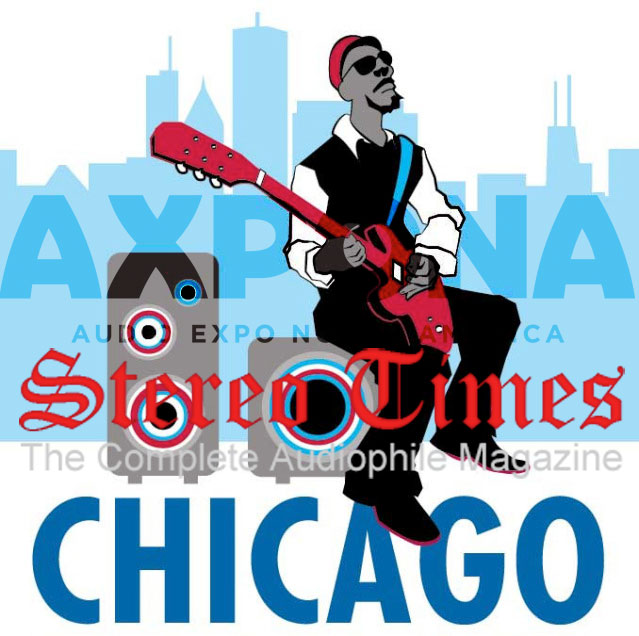
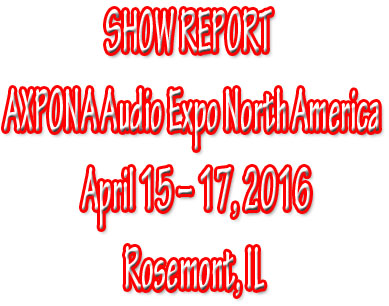
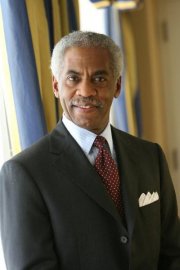 My visit to this year’s Axpona event was actually fun, relaxing and also an excellent time for not only checking out the numerous exhibits but also for reconnecting with colleagues, long-time friends, acquaintances, as well as making various face-to-face introductions with individuals who I’ve only met previously through email or via phone. With high-end audio being a noted cottage industry – relationships often play a big part of how things get done. Beyond this important aspect of the event – and perhaps due to the rather mild and relatively benign weather conditions throughout the extended weekend, I heard very little, if any, in terms of complaints regarding travel issues. For me – with Chicagoland being within striking distance of the Twin Cities (i.e., Minneapolis/St. Paul) – I decided to make the trip via personal auto. Accompanied by my wife, and equipped with entertainment via several audio tapes (i.e., mysteries by John Grisham), the drive was easy-breezy and only slightly more than 6 hours each way. Definitely beats the hassle (and expense) associated with airline travel for a relatively short trip.
My visit to this year’s Axpona event was actually fun, relaxing and also an excellent time for not only checking out the numerous exhibits but also for reconnecting with colleagues, long-time friends, acquaintances, as well as making various face-to-face introductions with individuals who I’ve only met previously through email or via phone. With high-end audio being a noted cottage industry – relationships often play a big part of how things get done. Beyond this important aspect of the event – and perhaps due to the rather mild and relatively benign weather conditions throughout the extended weekend, I heard very little, if any, in terms of complaints regarding travel issues. For me – with Chicagoland being within striking distance of the Twin Cities (i.e., Minneapolis/St. Paul) – I decided to make the trip via personal auto. Accompanied by my wife, and equipped with entertainment via several audio tapes (i.e., mysteries by John Grisham), the drive was easy-breezy and only slightly more than 6 hours each way. Definitely beats the hassle (and expense) associated with airline travel for a relatively short trip.
OK, moving on – first, congratulations to Steve Davis and the Axpona team for what appeared to be a very well planned, organized and implemented event. The overall program design and scheduling for the various lectures, entertainment and various other key activities was also done well. Another positive aspect of this event is the actual hotel property including how things seemed to be fully in place and ready for action upon arrival of both the exhibitors and attendees. Beyond that – the crowd flow never seemed to get out of hand or over bearing. Hallways remained reasonably passable and even when exhibit rooms became full – there was a relatively smooth rotation of people in and out of the room with everyone being able to gain access to various exhibits whenever they wished to do so.
The Marketplace was a well-organized venue where attendees had access to various types of goodies (i.e., including equipment, recordings, cables and much, much more) with a noticeably busier pace on both Friday afternoon and all day Saturday. I wasn’t around for Sunday so not sure how things went that day. One other thing I did notice – there seemed to be quite a few exhibitors advertising “Show Specials.” During various conversations I had with numerous exhibitors (i.e., including distributors, retailers and manufacturers), clearly their presence at this particular event was very much about creating greater awareness of who they were along with emphasis on their products as well as making sales. This show definitely caters to the consumer crowd and I’m sure there were any number of persons who were able to negotiate good deals for themselves.
Before I share my comments (and photos) regarding the various exhibits at this year’s event, let me state up front that this report will not include any sort of “Best of Show” announcement or competitive ranking. My reason for taking this position is simple – shortly after experiencing the sound in a number of different exhibits ranging from modest setups to some that were more extensive and fairly elaborately laid out, it became quite apparent that the wide variance in sound wasn’t necessarily tied to the equipment or the placement in the room but some other factors. This type of scenario seems to play out often and in some cases is well beyond the control of the exhibitors. Whether the electronics needs to have AC running through their circuits, speakers need to have their drivers pumping or complex cables need to acclimate after being twisted, turned, pulled and/or pushed – who knows but something mysterious always seems to plague exhibitors at these types of shows. Additionally, for the most part – the exhibit spaces are typically stripped down hotel rooms with room acoustics that are designed for high-end audio demonstrations per se. Additionally, the house AC provided by the hotel now has lots of exotic (and demanding) electronics plugged into the wall as their primary source of juice. This doesn’t sound like a winning formula for success and despite the many anomalies involved – some exhibits are actually able to bring forth very good sound or at a minimum – provide a glimpse into the overall capability of the system assembled. As such – when and where I experienced something particularly appealing sonically, I will let you know.
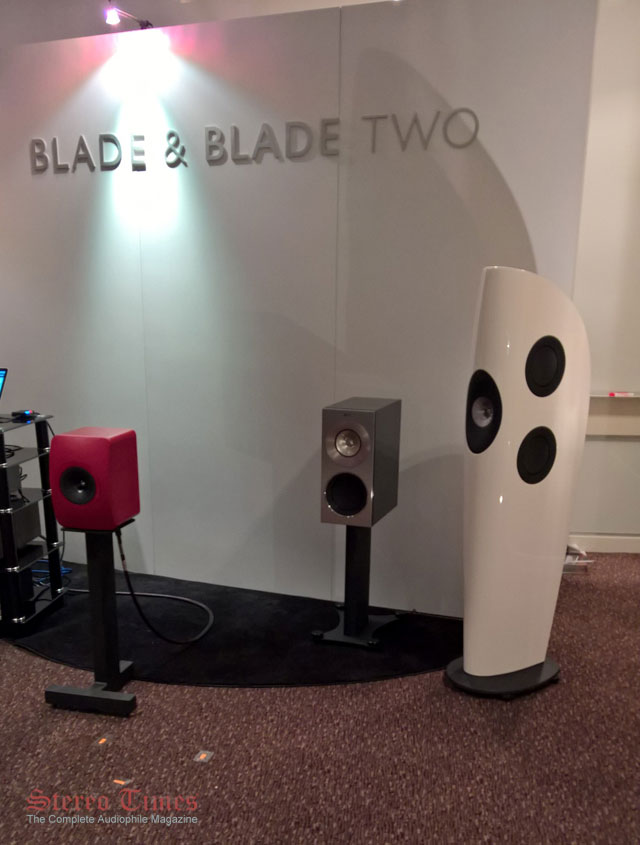
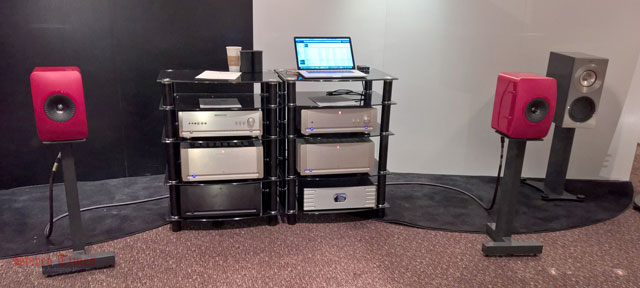
Before the official opening for the show, I attended a special pre-show breakfast for the Media/ Press early Friday morning. This event was graciously hosted by KEF. On display were the highly regarded Blade 2’s along with the REF One and LS50 loudspeakers. These were being powered by Parasound electronics. Immediately after breakfast, we were treated to a short walking tour with Steve Davis, show organizer, providing information regarding various changes made to enhance this year’s event. As such, will provide comments later in this report about the KEF exhibit. In terms of changes to the show venue, Davis took us to a large room on the main floor set aside where manufacturers could display new products. These were all passive displays. As we traveled along the main floor – I must mention that I had an opportunity to briefly poke my head into the MBL exhibit along the way. In this room was their flagship system called the X-treme that retails at $558,200. This totally exotic and rather large system included the mbl 101 X-treme speakers with their adjoining woofer towers, CD transport, D/A converter, Preamplifier and four (4) model 9011 power amplifiers. Quite a visual sight to behold. Since we were being escorted around on a tour, there wasn’t sufficient time for a good listen. Back to this later as well.
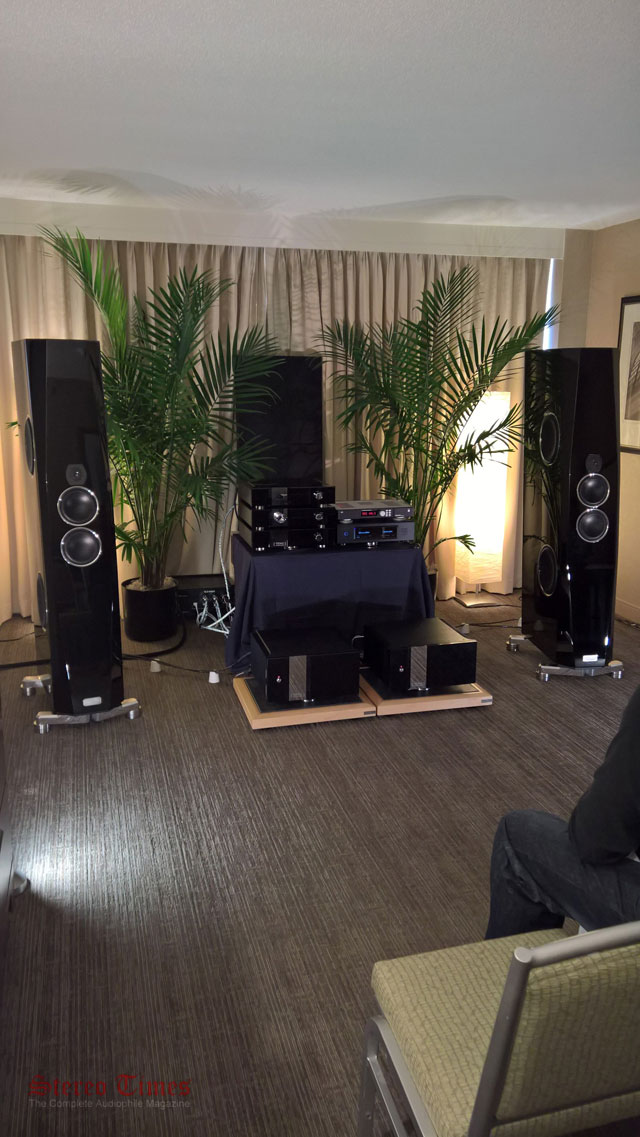

Shortly after the tour – I made a hasty retreat to the exhibit hosted by Doug White, The Voice That Is. Doug has consistently had excellent sounding exhibits at various high-end audio shows including previous years’ exhibits at the Axpona Audio Show. This year’s exhibit, which I visited several times, was again absolutely superb. On display were the Tidal Agoria speakers in a stunning Midnight Gloss Black finish ( $109,900), driven by a suite of Tidal electronics including the full function Presencio Preamplifier with phono ($77,990), Tidal Impluse Monobloc Amplifiers ($64,990), Bricasti Design Ml SP DAC ($9,995), Aurender W20 Reference Music Server ($17,600), Still Points Ultra equipment rack , Dynamic Design Heritage Challenge AEII power cords and speaker cables. All of this was packed into a relatively small room however the set-up was excellent. In terms of the sound – it was superbly clean, clear, wide open, very transparent with solid impact, tremendous dynamics and produced an uncolored wave of sound that simply washed over the listeners. Beyond that – Doug is an absolute master in terms of providing outstanding musical selections with a wide range of genres to suit just about anyone’s tastes. Everything for this particular show was digital playback and unapologetically Doug claimed it was all standard Reedbook 44/16 bit recordings. During my visits, I listened to blues, jazz, fusion, classical as well as an absolutely outstanding vocal choral group that was totally gripping in its presentation. And here’s the real kicker – as clean and clear as the sound was, it also had a very high emotional content and very effectively made you feel as though you were right there live and in person.
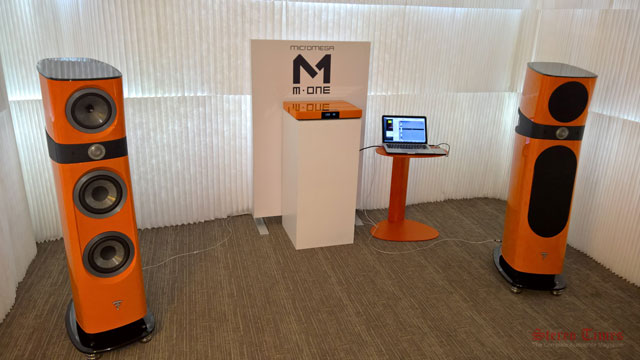
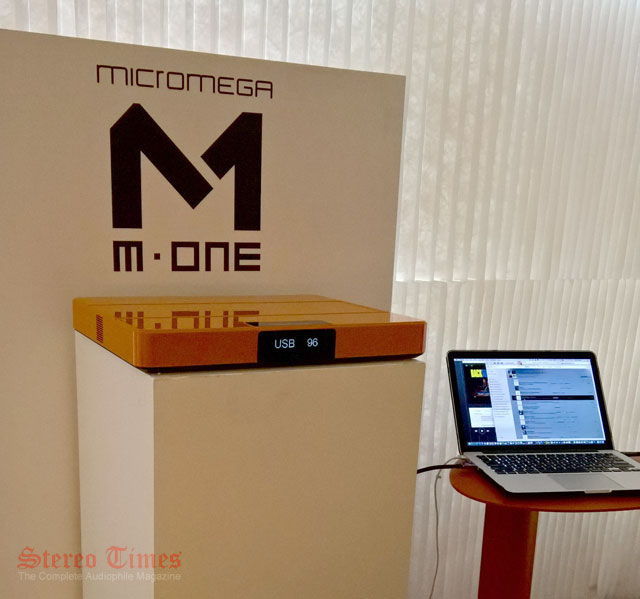
Next stop on my journey was the Focal Suite featuring their Sopra 2 loudspeakers that were powered by the 100 watt, solid state Micromega M One amp with integrated DAC ($4,000). Crystal Cable hooked everything together and this rather uncomplicated, straight-ahead system provided a very nice visual effect and with very good sound. Continuing on I then visited the Sonus faber suite featuring their Amati loudspeakers ($36,000) powered by an array of McIntosh electronics. Very excellent sound as you would expect from this world class loudspeaker manufacturer.
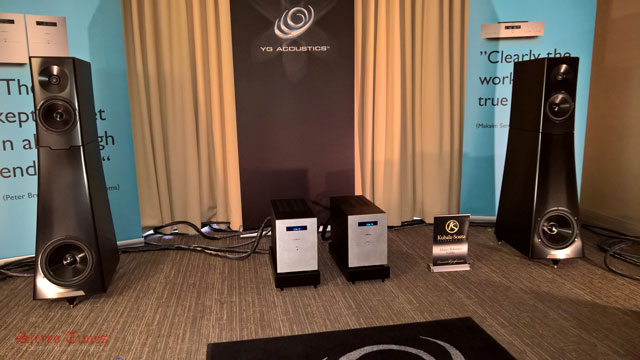
Next stop was a visit to one of the four suites hosted by Bill Parish, GTT Audio. My initial GTT tour started with a visit with Dick Diamond, YGA loudspeakers, and to check out this exhibit featuring the highly acclaimed YG Hailey 1.2 loudspeakers ($42,800). These were powered by superb Audionet electronics including the PRE G2 Preamp ($23,350), MAX Mono Amps ($30,500 pr.), PAM G2 Phono ($10,100), EPX Optional Power Supply (i.e., $10,100), DNC Streaming DAC ($10,100) and EPS G2 Optional Power Supply ($4,050). Feeding sweet analog signals to this system consisted of the following vinyl playback gear: Kronos Pro Turntable ($38,000), Kronos Black Beauty tonearm w/armboard ($10,000) and Air Tight Opus cartridge ($15,000). All of these wonderful components were wired together with an array of cables from Kubala Sosna including Elation! Interconnects/speaker cables ($6,000), power cords ($1,800 each), Ethernet cable ($@,500) and Xpander ($4,800). Very nice selection of classic recordings (i.e., jazz, big band, classical, other) and this a room that was simply musical to a very high degree. From my recall and notes – the sound eas simply excellent in just about every respect. It was tight, controlled with a very natural tonal balance. Smooth and with solid dynamic snap. In a sense – the sound was pure, clean and very easy on the ears. Great example of creating synergy through proper matching of various components to produce a highly musical sound. I literally sat in this room for numerous recordings and loved every minute of it.
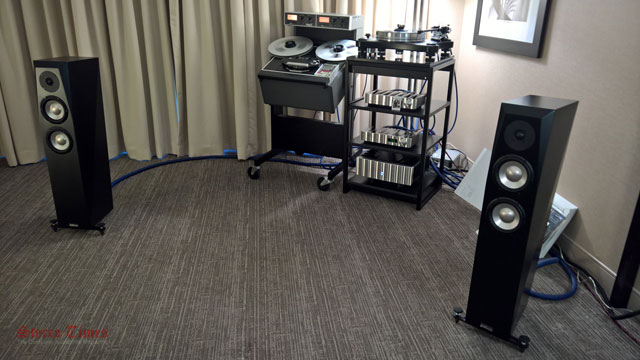
Moving on, next stop was actually one of those stand out moments. At least for me it was. This was a visit to the Joseph Audio suite. Jeff Joseph makes superb loudspeakers and at very attractive price points. This exhibit was no different and offered a glimpse into the big time high-end sound at a price that was somewhat surprising to me. On display was the two-way, floor-standing Profile speakerspriced at $7,000. Amplification was courtesy of non other than Jeff Rowland electronics. This included the Capri preamp ($3,900). This same unit equipped with an internal DAC retails for $4,400 and with internal phono stage it retails for $5,000. This was coupled with the Rowland Model 625 S2 stereo amplifier ($15,900). Musical input was either a VPI turntable with JMM Memorial tonearm. Sound with this system was quite outstanding and given the total price – had to be one of the biggest bangs for the buck. However, when it came to truly outstanding sound – Jeff loaded up his big Ampex tape machine spinning some seriously good half-inch remastered recording by Acoustic Sounds. All I can say is…:”Oh My, what a sound!” To say that the system lit up is putting it mildly. What this really helped me to get a grip on was that these relatively inexpensive full range speakers were fully capable of delivering the goods. Very nice job Jeff!
Picking up from where I left off from my initial show report, and as my journey continued through the halls of the Axpona Expo host hotel, clearly the level of attendees picked up significantly from Day 1 making it a bit more of a challenge navigating my way around. Additionally many of the show exhibits had become noticeably more crowded so I found myself attempting to catch more of a glimpse of what was happening in various suites vs. taking too much time with any real assessment regarding the overall sonic merits of individual systems. Also, as I mentioned in very the beginning of my reporting for this show, as well as based on my observation from a brief visit during last year’s show, at this same hotel property, I made a conscious decision to not attempt to do any sort of “Best of Show” rating or ranking. Instead, my efforts were to focus and concentrate more on providing information regarding the various system setups in as many different exhibits as I could reasonably experience. For sure there were numerous examples of good sound, and often from relatively moderately priced systems (i.e., by high-end audio standards, that is), but unfortunately there were also any number of exhibits with big name manufacturers where I expected to hear something special but was surprisingly underwhelmed and generally disappointed. Anyway – blame it on the room(s), or perhaps the AC, or even maybe inadequate the setup or whatever. Who knows and I’m certainly not the guy to determine the cause or the fix. I’m just telling you what I saw and what I heard.
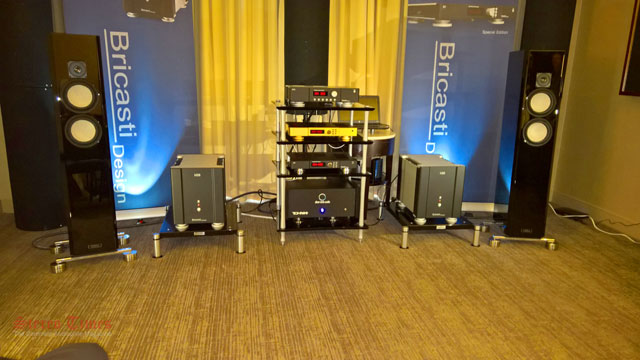
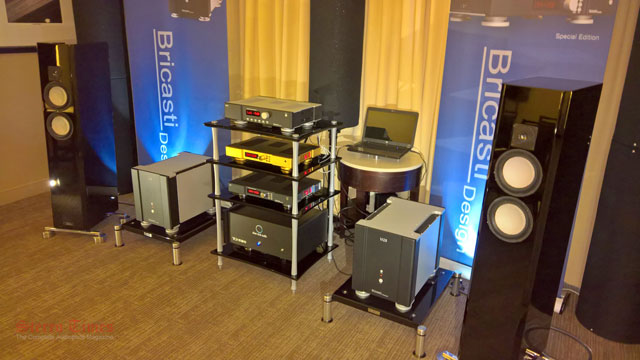
So having said that – let me start with something positive and gave me encouragement. Stopping by the Bricasti Suite, I was greeted with sweet, glorious sounds emanating from a pair of Tidal Piano Diacera loudspeakers (i.e., diamond tweeter version). These speakers are no longer a current production model for Tidal and have been replaced with a significantly upgraded version. I’ll explain a little later on. The upfront electronics included the top-of-line Bricasti M1 DAC (Limited Edition) in a special upgraded gold finish ($15,000). If I caught this right, believe this unit also includes various internal upgrades as well. The M1 DAC is also available as the Special Edition at $10,000. The DAC was mated to Bricati’s new M12 Dual Mono Source Controller ($15,995). The amplification was a pair of the Briscasti M28 mono block amps ($15,000 per unit). The press release and media announcement for the newly designed M12 was very quite recent and just prior to this particular show. As such, I was anxious and very much interested in checking it out. Based on what I heard – I definitely wasn’t disappointed and was thoroughly impressed. Oyaide Cables were used throughout the system and Still Points Isolation helped to keep the electronics anchored to a non-resonant equipment platform to enhance their overall performance. Two things of note: first, the Briscasti also had one of their DACs in service in the Tidal Suite hosted by Doug White (i.e., The Voice That Is) where the sound was also quite notable and highly praised. The second thing is this – as I mentioned, the pair of Tidal (Piano) speakers in the Bricasti suite are now discontinued but judging from the overall sonic performance in this exhibit, these speakers are still fully capable of providing wonderful sound. Their successor is called the Tidal Piano G2 and is priced at $27,000 (i.e., non diamond tweeter version). Unfortunately this newer model was not being exhibited and I’m anxiously awating an opportunity to audition them soon. I’ve also heard that there will be a version with the diamond tweeter with a retail price slightly over $40k. My conclusion – the Bricasti electronics, particularly the DAC and Tidal speakers, seem to have a certain synergy that helps to enhance their collective sound and produce outstanding results.
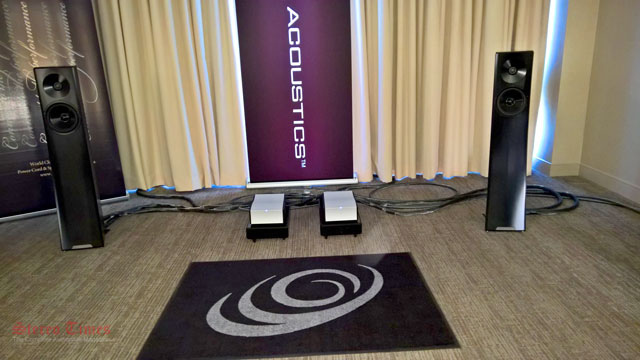
Next room on my visit trail was another exhibit hosted by Bill Parish, owner of GTT Audio. In this suite the featured electronics were the Mola Mola Makua linestage ($11,740). This unit is available with either an optional phonostage ($2,900) or internal DAC ($7,850). These electronics were mated to a pair of Molo Mola Kaluga mono amplifiers ($16,500 pr). For spinning vinyl, the Kronos Sparta turntable ($21,500) was called into action including the Kronos Helena tonearm ($7,125) and Air Tight Supreme moving coil cartridge ($11,000). As per usual practice for GTT Audio exhibits – the cabling system was all Kubala-Sosna cables. He configuration for this system was: Emotion interconnects ($3000), speaker cables ($3,000); Emotion power cords ($1,100), Elation! Ethernet cable ($2,500) and Kubala Sosna Xpander ($4,800). This system was coupled to a pair of the newer YG Acoustics Carmel 2 speakers ($24,300). I’ve recently heard almost this same exact system (i.e., recent visit to GTT Audio in Long Valley, NJ) and can attest to the overall sound capability of this same system. At the time of my visit at this show, the sound did not have quite the same magic as what I have experienced recently. Plus with the recent high-praise and acknowledgement of this particular version of the YG speakers, this was clearly another case where the room had some sort of variable interaction with this particular system. Frustrating for sure for all exhibitors who experienced similar results.
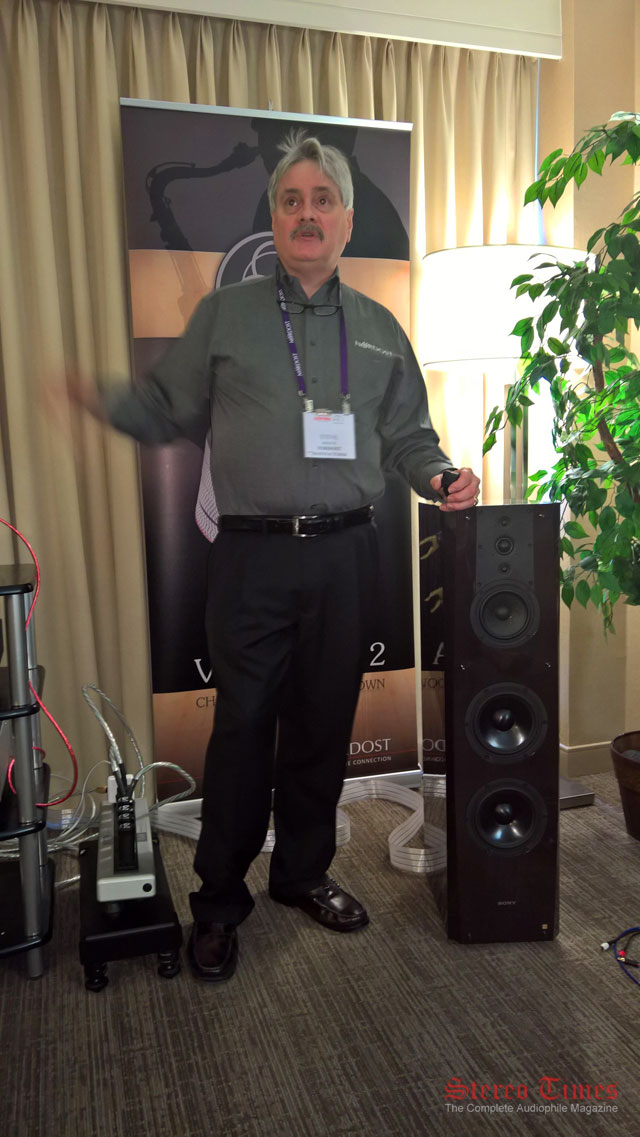
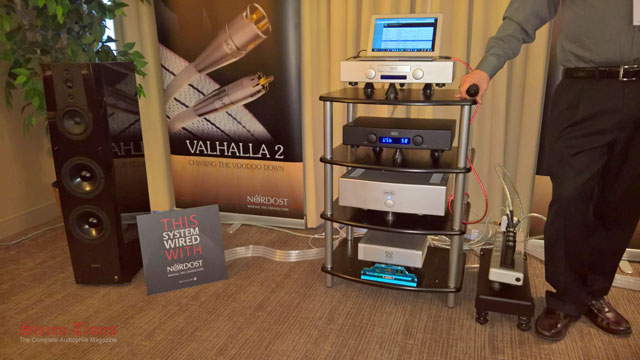
Moving on a visit to the Holm Audio exhibit where featured products included Nordost LEIF/Norse/Vahalla 2 Reference cables, SORT Systems and QRT power products, Sony NA2es loudspeakers ($9,998), Hegel HD30 DAC Airplay/DLNA ($4,800), Hegel H20 power amp ($5,750), Hegel CDP4A CD player ($4,000). The good news is that this relatively modest cost system seemed to have some real juice to it and sounded quite good. Unfortunately, due to the exhibitor focusing more on demonstrating the Nordost Sort System and QRT QBase AC distribution unit with various plug-in devices (i.e., Qvibe AC Line Harmonizer and Qkoil AC Line Enhancer), I wasn’t able to get a full handle on the sonic capability of this system. However, I have to admit to being pleasantly surprised at the effectiveness of the Nordost demo and based on what I heard, would recommend to whoever might be interested in addressing various AC anomalies in your reference audio system to check this out. Again – kudos to this exhibit providing good sound without breaking the bank.

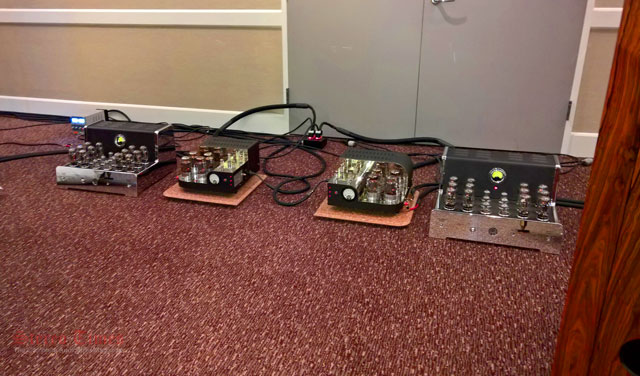
Visiting the large exhibit space designated as the “Director’s Parlor” (i.e., actually Atma-Sphere Music Systems exhibit), I found this to be an interesting and intriguing experience. Head guru for the company, Ralph Karsten, had on display a variety of his tube based electronics mated to some rather unique, and fairly largish, hybrid horn speakers by Classic Audio Loudspeakers. The speakers included both the T-1.5 Reference that features an 18” low bass woofer, 15” mid-bass woofer, 2” throat/4” diameter Beryllium diaphragm midrange compression drive mounted on a specially designed wood “tractrix” horn and completed with a magnesium domed super tweeter with claimed extension to 45 kHz. The other speaker was the Hartsfield model. This is a legendary speaker that was introduced in 1954 by the James B. Lansing Sound Company. It was also introduced initially as a single speaker for mono was the primary sound reproduction format. This speaker product was later reintroduced to the market (circa 1988). Standard finish is oiled rosewood and includes the following driver complement: 15” low frequency driver coupled to a long exponential horn. The midrange starts at 500 Hz and covered by a 2” driver coupled to a horn lens assembly. The ultra high frequencies start above 12,500 hz and are covered by a super tweeter.
These speakers were driven by various Atma-Sphere electronics (i.e., preamplifiers and OTL amplifiers) along with the source being analog. Turntable was unknown (i.e., perhaps Oracle) and fitted with a Tri-Planar tonearm. Cabling throughout the system was Purist Audio Design. Hard to get a handle on the sound in this room, at the time that I visited, due to multiple conversations (i.e., mini-meetings) taking place simultaneously and the volume down fairly low. However, what I did hear was super smooth, totally relaxed and effortless with a very neutral tonal balance. Wish I could have been there to kick up the decibels a bit but no such luck.
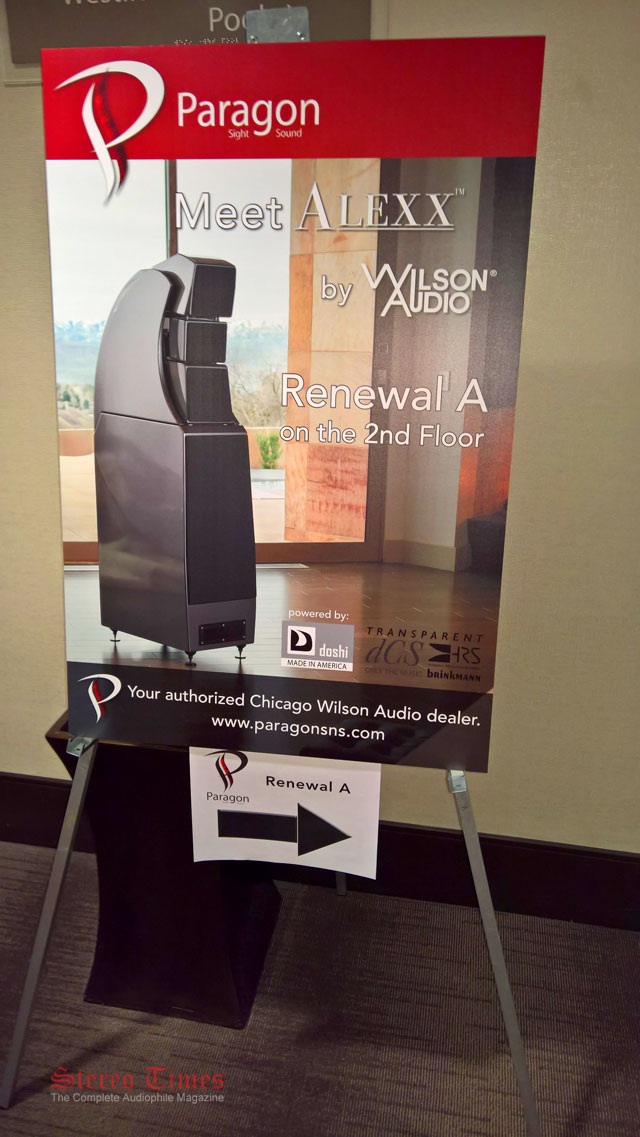
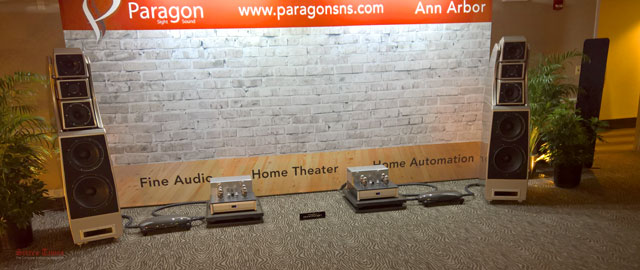
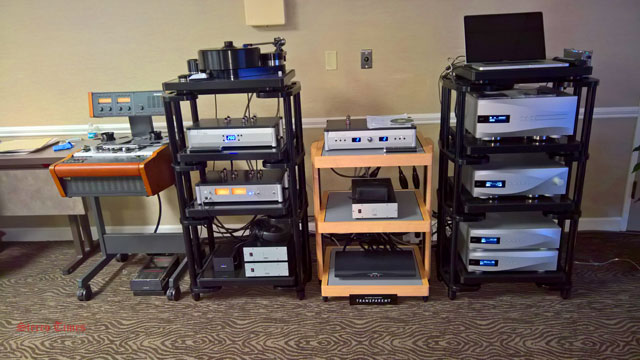
With much anticipation as well as invitation and advance reservation to attend a special session for the purpose of launching the new Wilson Audio speaker, I stayed after regular show hours and found myself in a wonderfully enthusiastic gathering – both press/media and various others. Center attraction of this event was of course the new Wilson Audio ALEXX speakers (i.e., referred to as successors to the Maxx series). However there were also products both on display as well as mated to the big Wilson speakers from a firm that I’m not at all familiar with named Doshi. They had on display a lineup of very sophisticated looking tube electronics (i.e., preamplifiers/linestages, amplifiers, other). In terms of source components – and I apologize that I’m unable to retrieve my notes that were somehow misplace – there was an absolutely gorgeous Brinkmann turntable/arm combination for spinning black vinyl as well as a seriously large Studer reel-to-reel tape machine (i.e., 30 ips). Digital processing was via the highly acclaimed dCS stack of digital components and cabling throughout the system was top-of-the-line Transparent Audio cables.
Before the listening started – snacks and beverages were provided in a most hospitable, warm and friendly environment. So far -we were off to a really good start. Later we were requested to take our seats so we could finally get to hear what we had all come for. However, as a prelude to the actual listening – chief designer Dave Wilson provided an overview that felt more like a legacy statement describing the evolution of his company and various iterations of his many different speakers. It was also as an opportunity to clearly discuss succession with clear acknowledgement of the new product having been the vision of his son. Shortly after this – we were finally provided an opportunity to hear these what we came to hear. In the past, I’ve had many opportunities to hear various versions of the MAXX model and with both solid state and tube electronics from such notable companies such as Audio Research Corp (ARC), Balanced Audio Technologies (BAT), LAMM, other, along with either analog or digital as the source. I’ve also heard these same speakers with any number of different cabling systems. As often as I’ve heard these speakers – there have been many instances of where the sound was quite superb and so very impressive. So with this as a backdrop, and hearing that the Alexx was designed to go beyond the MAXX – I was all prepared for sonic nirvan
Stereo Times Masthead
Publisher/Founder
Clement Perry
Editor
Dave Thomas
Senior Editors
Frank Alles, Mike Girardi, Russell Lichter, Terry London, Moreno Mitchell, Paul Szabady, Bill Wells, Mike Wright, and Stephen Yan,
Current Contributors
David Abramson, Tim Barrall, Dave Allison, Ron Cook, Lewis Dardick, John Hoffman, Dan Secula, Don Shaulis, Greg Simmons, Eric Teh, Greg Voth, Richard Willie, Ed Van Winkle, Rob Dockery, Richard Doran, and Daveed Turek
Site Management Clement Perry
Ad Designer: Martin Perry



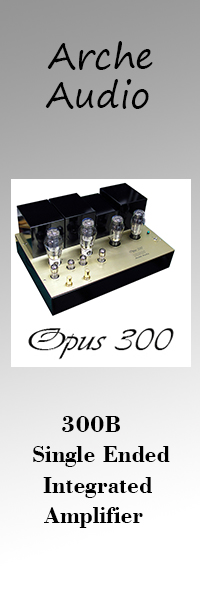
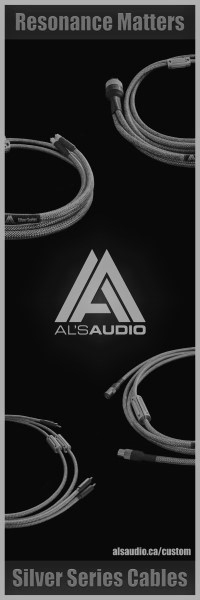
Be the first to comment on: AXPONA 2016